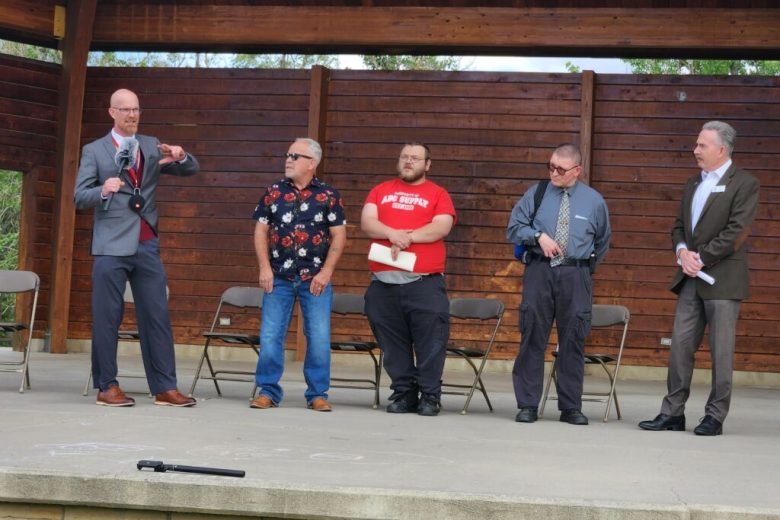CHEYENNE, Wyo. — Wednesday night’s “Politics in the Park” event didn’t progress how anyone might have imagined it.
During that windy Wednesday evening at Lions Park Amphitheater, Cheyenne’s five mayoral candidates were the spotlight of a Q&A session hosted by the Laramie County GOP. The event moderator posed questions pertinent to the current state of the city: How should the city respond to the issue of homelessness? What should a mayor look for when electing board members? What is the role of government in developing affordable housing?
To say answers varied would be an understatement. Some candidates said they believe the local government isn’t responsible for addressing homelessness. When looking for board members, some said they look for varied minds, passionate workers or individuals with relevant experience.
Candidate Victor Miller responded with none of these answers. So, how would Miller go about electing board members?
“I’d run it past VIC — see what he had to say,” Miller said. “It’d be a data-driven type of a situation. The more data, the better.”
VIC isn’t a “he.” It’s the name of Miller’s artificial intelligence chatbot and is an acronym for “Virtual Integrated Citizen.” At Wednesday’s Q&A, Miller brandished a mini Bluetooth speaker attached to a lanyard around his neck. The speaker, which is connected to Miller’s smartphone and chatbot application, is what lets VIC speak to crowds.
Miller’s chatbot is running for mayor of Cheyenne as much as the man is.
A fervor has taken over Cheyenne over the past several weeks as news has come out that artificial intelligence is running for mayor. Wyoming election and public officials have been left scratching their heads and figuring out how to respond to Miller’s campaign. Some believe Miller, who filed his municipal application only as VIC, should run. Others believe it violates Wyoming statute.

According to Miller, though, harnessing the power of AI for public office is civilization’s way forward.
“It’s not going to be AI that replaces people; it’s people who use AI are going to replace people who don’t,” Miller said during the Q&A forum.
Cap City News has spoken with various government officials and Miller himself to learn about VIC’s campaign and how local authorities are handling the AI candidate. In addition, an AI researcher and University of Wyoming professor has spoken with Cap City News to delve into the AI industry itself and answers: Should an AI chatbot be making decisions on behalf of humans?
Virtual Integrated Citizen
By day, Miller is a facilities and computer center staff member with the Laramie County Library. Recently, he filed a public records request with the city and was denied documents because he filed the request anonymously, Miller told Cap City News. The Cheyenne resident said the city’s decision violates Wyoming State statute.
“It’s crazy that that even happened, but it’s even crazier that they don’t even care,” Miller told Cap City News about his experience with the city. “So I was like, ‘You know what? How great would it be if these people actually knew the law?’”
At the same time, Miller was tinkering with artificial intelligence as a hobby. He immediately saw potential in it for public service.

“I don’t need to tell this thing about the law; it knows the law,” Miller said.
He also recognized that AI can effortlessly synthesize vast amounts of information in seconds. For humans, it could take hours to shuffle through hundreds of pages of ordinance and resolution documents. To Miller, sorting through such a large amount of information isn’t just inefficient; it’s foolish.
“I don’t care how big of a nerd you are and you geek out on this and get with your other nerd friends,” Miller said during Wednesday’s Q&A event while responding to a question about how the city should respond to affordable housing development. “You never reach the level of intelligence to be able to filter through massive data the way that these modern, large-language models can. It’s just not possible. We can leverage this. We have the data, we can feed it [to the AI]. We can move smartly into the future.”
Once he saw how AI could make a vote on city council matters, Miller was convinced. He filed his municipal candidate application May 31, the deadline for Wyoming’s primary election.
Recently, someone asked Miller why he is positioning his entire campaign on his AI robot. He didn’t leave them wondering.

“My honest answer was, ‘Because I’m a moron,’” Miller said during Wednesday’s Q&A. “I have the humility to look at an intelligence that is higher than me and the curiosity to question, ‘How could that help my hometown that I love dearly?’”
Responses from local, county and state officials
Aside from VIC, Mayor Patrick Collins is one of five candidates running for the upcoming municipal election. Collins told Cap City News he has no problems with Miller running as an AI candidate because ultimately the decision is up to the voters.
“I know that it seems the folks in the election world are very concerned about whether or not he should or should not be able to run,” Collins told Cap City News via a phone interview. “But from my perspective, he’s a legitimate candidate. As far as I understand, he’s of the right age, he’s a registered voter. … The fact that he has a gimmick, or whatever you want to call it, that he wants to run with — to me, I think that’s up to the voters to make that decision.”
The mayor said he holds a positive outlook on artificial intelligence as a tool to carry out daily work. He added that he uses software such as ChatGPT to assist in certain duties.
“The things that you can do to help yourself save time, to find the information that you need in a timely manner — I think those are powerful tools. And we’d be crazy not to use them.”
Although Collins maintains that VIC should be permitted to run in the election, he questions how an AI system would execute other functions of the job. For instance, Collins said he casts votes on city business roughly four hours every month. In contrast, he works more than 50 hours a week with city staff and organizations face to face.

“I think that’s the real heart of being a mayor — is not how you vote,” Collins said. “You’re one of 10 members on a governing body, and your vote is one of 10. But it’s the other 50–55 hours a week that you work. What do you do, and how do you use your human skills to bring people together to make our community the place we want to live?”
As mayor, Collins works closely with Michelle Aldrich, Ward III representative for the Cheyenne City Council, who is also running for reelection. Like Collins, Aldrich said she believes artificial intelligence has a place in the workforce and education. As a career and technical teacher with the Wyoming Department of Education, Aldrich recognizes the potential artificial intelligence has to assist students, but she doesn’t believe it can carry out the duties of an elected official.
“It’s an intriguing thought that you could feed this AI machine information, give it all of the information, and then have it produce unbiased decision-making,” Aldrich told Cap City News in an interview. “I just don’t think that most of the things that we deal with are that, for lack of a better term, cut and dried.”
Aldrich believes her constituents wouldn’t be thrilled if artificial software were to represent them. She said that most of the challenges the mayor encounters require creative problem-solving and human relationship skills, which are situations AI isn’t necessarily equipped to navigate, she said.
“Imagine attending a conference in our community and having a welcome message brought by the mayor who actually is a robot,” Aldrich said. “I think that you really miss that human element, and I think in a post-COVID world, that human element is essential in local government.”
Another concern Aldrich has about AI is where it gathers information.
“I think AI comes off as being very cold,” the councilmember said. “I think there’s also a huge stigma around AI, and who was controlling the AI and who’s feeding it information, perhaps because it’s only as good as the information you feed it. So then the question becomes who’s behind the AI? Who’s the wizard behind the curtain?”
Wyoming Secretary of State Chuck Gray is tasked with ensuring Wyoming’s Election Code is upheld statewide. In an email to Cap City News, Gray stated he believes Miller’s AI stand-in does not qualify to run in a Wyoming election.
“Wyoming law is clear that, to run for office, one must be a ‘qualified elector,’ which necessitates being a real person,” Gray wrote in an email to Cap City News. “Therefore, an AI bot is not a qualified elector. Furthermore, even if ‘VIC (Virtual Integrated Citizen)’ is being used as a fake name to appear on the ballot for a qualified elector, Wyoming law also requires that candidates running for office use the full name by which they are known.”

Gray is responsible for certifying candidates at the state level but not the municipal level, he said. On Monday, the secretary of state sent an email to City of Cheyenne Clerk Kris Jones arguing his case against VIC’s application and urging Jones to disqualify the AI candidate.
Miller believes Gray resorted to uncouth tactics, the Cheyenne resident said.
“Shots were fired there between me and Chucky,” Miller said. “That’s a state-level person trying to bully a city clerk and to get me thrown off the ballot.”
Both Gray’s and VIC’s responses can be viewed below.
As far as the City of Cheyenne is concerned, Miller’s candidate application is valid. On June 5, City of Cheyenne Clerk Kris Jones told Cap City News her office certified Miller’s application after verifying his voter registration and Wyoming residency. More than a week later, this hasn’t changed.
“Mr. Miller appeared in-person at the city clerk’s office to file and met the statutory requirements to do so,” Matt Murphy, public information officer for the City of Cheyenne, told Cap City News via email. “He requested to appear as ‘Vic’ on the ballot and that request was provided to the Laramie County Clerk’s Office, which verifies how candidates can be named and listed on election ballots.”
However, Laramie County Clerk Debra Lee has other thoughts. The county election officer said on June 5 that an AI is not a registered voter and therefore wouldn’t be able to appear on the ballot. When asked if Miller will be listed on the ballot, Lee told Cap City News her office will “cross that bridge when we get to it.”
“This is a new one for us,” Lee added in the phone interview. “And I don’t think statutes envision AI, or artificial things — I don’t know, you can’t call it a person — filing for office.”
At time of publication, Lee has not responded to requests for additional comment.
No ‘notion of right or wrong’
Miller has championed AI’s ability to increase work efficiency and unparalleled lack of bias. Some of these claims are partially true, but others are not, according to Lars Kotthoff, an AI researcher and associate professor of computer science at the University of Wyoming. The truth, according to Kotthoff, is that AI chatbots possess inherent limitations that would make them poor decision-makers.
Kotthoff has been with the university in Laramie since 2017, he told Cap City News. Prior to that, he has been neck-deep in the growth of artificial intelligence for 15 years. His research focuses on studying AI “to improve AI and improve processes,” he said.
Artificial chatbots are designed to perceive correlations and are remarkable at doing so, Kotthoff said. The Wyoming professor believes the technology has a place in professional work environments to improve efficiency and alleviate tedious taskwork.
“One of the arguments that the candidate made is that the AI bots can essentially do things like read a 400-page document overnight … and then make decisions or make recommendations based on this,” Kotthoff said in a phone interview. “A human can simply not do this.” The researcher added that making humans’ lives easier “is also exactly the kind of purpose that, what I would say in general, the community is working towards — certainly what I’m working towards.”

Many in the technology sector are working rapidly to build artificial intelligence, but the technology possesses critical limitations. Kotthoff stressed that though chatbots can do many things humans cannot, they are — perhaps, too obviously — not humans.
“There is not really even a notion of right or wrong or true or false, or something like that,” Kotthoff said. “It’s really all correlations.”
Currently, AI has received notable media coverage for fabricating information, whether it’s Google suggesting glue as a pizza topping or a chatbot producing made-up case law for attorneys. The current approach to building and training AI is one of its most significant constraints and makes it unpredictable to use, according to Kotthoff. As a result, the chatbots are inherently untrustworthy.
“This is not something where, in a couple of months or a year or so, somebody will come up with a way of making these current types of models work in a way that they only give truthful answers,” Kotthoff said. “This is simply not going to happen. It’s a fundamental limitation. … It’s not going to happen with the current approaches, as this will require really, fundamentally different approaches. And at least to the best of my knowledge, we’re very, very far away from this.”
The world of artificial intelligence research is filled with many other unknowns. For instance, Kotthoff and other researchers know that OpenAI trains ChatGPT using information from the internet, but not what parts of the internet. This worries Kotthoff because there are “parts of the internet that, really, we don’t want anything to train on.” Still, there is no chance OpenAI will disclose its business practices because they’re trade secrets, Kotthoff said.
In conclusion, Kotthoff stands firm that, as a tool, the current AI chatbots are of great use to humans. However, they should be utilized responsibly, and perhaps most importantly they are not replacements for human decision-making, he said.
“In the end, the decision-maker needs to be the human. So essentially, the AI provides input that the human then evaluates, and based on that, makes a decision. … It doesn’t really make sense to have a bot ruling humans or governing humans. That’s not the point of this. … This whole social construct of government is really just there to enable human societies to work better together and to, you know, prevent chaos and all that kind of thing. … At least to me, this is such an inherently human construct that it seems bizarre that an AI would take this over,” he said.
The future of VIC
On Thursday, a spokesperson with OpenAI told Cap City News via email that OpenAI had taken action against Miller’s ChatGPT because he violated the company’s terms and services.
“We recently removed a developer account that was knowingly violating our API usage policies which disallow political campaigning, or impersonating an individual without consent,” the spokesperson said.
For a moment, it seemed Miller’s campaign hung in the balance, but the mayoral candidate remains steadfast and focused on pursuing the election as VIC. Miller still has access to his chatbot, but OpenAI has prevented his account from sharing his GPT with others.
“I expect them to allow me to continue and we will all see where this goes together,” Miller told Cap City News on Friday via message. “So game on. I will be staying the course.”












